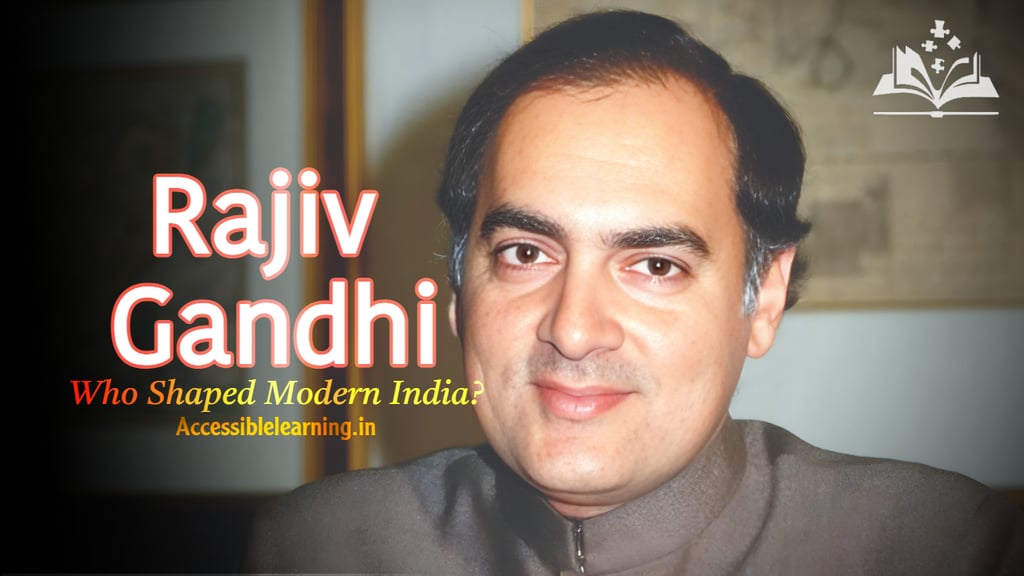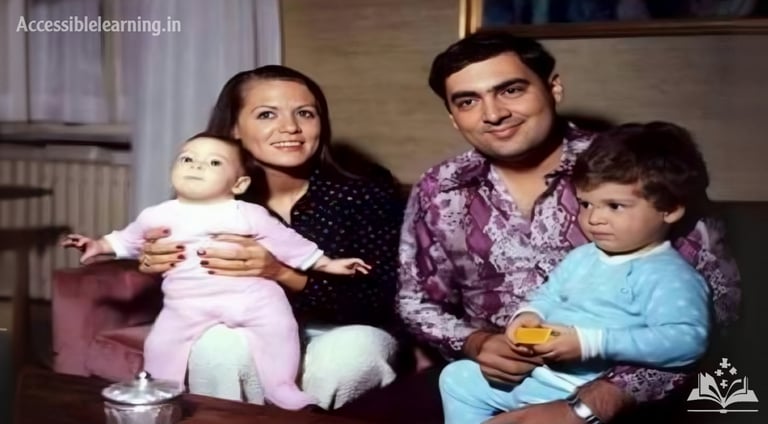
How Rajiv Gandhi Revolutionized Technology and Governance in India?!
Explore the legacy of Rajiv Gandhi, India's 6th Prime Minister, whose forward-thinking vision and dedication to modernization transformed the nation's trajectory. Discover his achievements in technology, economic reform, and grassroots governance, as well as his enduring impact on India.
INCPOLITICAL JOURNEYBIOGRAPHY/HISTORYTHE GREAT LEADER
Sachin K Chaurasiya
11/18/20246 min read


Rajiv Gandhi Ji, the 6th Prime Minister of India, remains one of the country’s most notable leaders, remembered for his forward-thinking vision and the transformative policies he introduced. Serving as Prime Minister from 1984 to 1989, Rajiv Gandhi’s leadership marked a shift toward modernization and economic reform. This article will explore his early life, political journey, contributions, and the legacy he left behind.
Early Life and Education!
Born on August 20, 1944, in Bombay (now Mumbai), Rajiv Gandhi belonged to the prominent Nehru-Gandhi family, which had a significant influence on Indian politics. He was the eldest son of Indira Gandhi, the first female Prime Minister of India, and Feroze Gandhi, a respected journalist and parliamentarian. Growing up in a politically charged environment, Rajiv initially avoided politics, pursuing an education and career far removed from public life.
He completed his schooling at the prestigious Doon School and then moved to London to study at the Imperial College London, later attending Trinity College, Cambridge. His love for flying led him to the profession of pilot, and he worked for Indian Airlines, preferring a private life with his wife, Sonia Gandhi, and their children, Rahul and Priyanka. Despite his family’s prominence, Rajiv remained uninterested in politics until fate intervened.
Entry into Politics!
Rajiv Gandhi’s entry into politics came after the tragic death of his younger brother, Sanjay Gandhi, in an air crash in 1980. Reluctant at first, he eventually joined the Indian National Congress (INC) at the request of his mother, Indira Gandhi. His charm, diplomatic approach, and calm demeanor won over both colleagues and the public, establishing him as a popular figure.
The real turning point came on October 31, 1984, when Indira Gandhi was assassinated by her bodyguards. Rajiv Gandhi was immediately sworn in as Prime Minister, stepping into a role of great responsibility at a time when India faced challenges on multiple fronts.
Rajiv Gandhi as Prime Minister!
Rajiv Gandhi’s tenure as Prime Minister was characterized by efforts to modernize and technologically advance India, and his forward-thinking approach resonated particularly well with India’s younger generation. Some of his notable achievements include:
Technological Modernization: Rajiv Gandhi promoted the idea of a “technologically strong” India. He spearheaded initiatives in computerization and information technology, recognizing their potential to transform the Indian economy. His support for the IT industry laid the foundation for India’s emergence as a global leader in software services.
Economic Reforms: Gandhi introduced policies that encouraged foreign investment and liberalized certain aspects of India’s economy, which had been closed to foreign influence. Though his reforms were not fully realized until later, they paved the way for economic liberalization in the 1990s.
Decentralization and Panchayati Raj: Rajiv Gandhi was a strong proponent of decentralizing power to local governments. Through the 73rd and 74th Constitutional Amendments, he advocated for empowering Panchayati Raj institutions, giving rural and local governance systems more autonomy and resources to make decisions directly for their communities.
Education and Youth Empowerment: Rajiv Gandhi placed significant emphasis on improving India’s education system and introduced the National Policy on Education in 1986. This policy aimed to revamp the education sector by focusing on quality education, increasing literacy rates, and creating more technical institutions.
Peace Efforts and Foreign Policy: Rajiv Gandhi maintained an active foreign policy, focusing on improving relations with neighboring countries. He signed the historic Indo-Sri Lanka Peace Accord in 1987, although it faced backlash in both countries. His peace efforts and attempts to resolve regional conflicts highlighted his diplomatic skills and desire for stability in South Asia.
Challenges and Controversies!
While Rajiv Gandhi’s tenure had many accomplishments, it also faced considerable challenges. The Bofors scandal—a controversy involving allegations of corruption in a defense deal with Sweden—tarnished his reputation. Though no conclusive evidence directly implicated him, the controversy damaged public trust and became a major factor in his party's defeat in the 1989 elections.
Additionally, his handling of the Tamil insurgency in Sri Lanka, though well-intentioned, resulted in unintended consequences, including the rise of opposition within Tamil Nadu and the eventual hostility of the LTTE (Liberation Tigers of Tamil Eelam).
Assassination and Legacy
On May 21, 1991, Rajiv Gandhi was assassinated by a suicide bomber from the LTTE while campaigning in Sriperumbudur, Tamil Nadu. His tragic death left the nation in shock and prompted reflections on the impact he had made within a short period.
Rajiv Gandhi’s legacy remains complex yet significant. His push for modernization and technology changed India’s trajectory, making it a more competitive player on the global stage. Despite the controversies, his dedication to economic progress, youth empowerment, and decentralized governance are pillars of his legacy.
His family, including his widow, Sonia Gandhi, and son, Rahul Gandhi, continues to be involved in Indian politics, ensuring that Rajiv Gandhi’s influence endures within the Congress Party and beyond.


The Rajiv Gandhi Foundation and Memorials!
In his honor, the Rajiv Gandhi Foundation was established to promote social, economic, and technological advancement in India. Several educational institutions, scholarships, and awards have been named after him, reflecting the ongoing respect and admiration for his contributions.
The Rajiv Gandhi Memorial at Sriperumbudur stands as a testament to his legacy, drawing visitors who pay homage to his life and vision for India. His legacy also persists in the form of numerous projects and policies that continue to impact the country’s development.
Here are a few additional points about Rajiv Gandhi that add depth to his story!
Vision for a Modern India
Rajiv Gandhi had a keen sense of how technology could elevate India’s global standing. He worked closely with technocrats like Sam Pitroda, introducing initiatives that advanced telecommunications and brought computers into government offices and educational institutions. This emphasis on digital infrastructure laid the foundation for India’s IT boom in the 1990s and 2000s.
Promotion of Science and Technology
Rajiv Gandhi recognized the role of science and technology in national development and introduced various initiatives to foster research and innovation. His government emphasized the expansion of technical education through the establishment of institutions like the Jawahar Navodaya Vidyalayas, which focused on providing high-quality education to rural children across India.
Environmental Advocacy
Rajiv Gandhi supported environmental initiatives and was one of the first leaders to address environmental challenges on a national level. His government focused on protecting wildlife, promoting afforestation, and advocating for sustainable development practices, showing early awareness of ecological concerns that would grow in prominence.
Efforts to Resolve Sikh Militancy
Rajiv Gandhi played a significant role in attempting to resolve the Sikh separatist movement in Punjab. He signed the Punjab Accord (also known as the Rajiv-Longowal Accord) in 1985 with Akali Dal leader Harchand Singh Longowal, aiming to bring peace to Punjab. However, while it temporarily alleviated tensions, it was followed by political challenges and violence, which eventually slowed progress.
Anti-Poverty and Rural Development Programs
Rajiv Gandhi introduced various programs targeting rural development and poverty alleviation. His focus on local governance reforms aimed to directly empower villages to address their own needs, particularly through programs that provided funds directly to panchayats. This strengthened rural infrastructure and community development.
Cultural Diplomacy and Soft Power
Rajiv Gandhi believed in using India’s cultural heritage as a diplomatic tool. He promoted Indian arts, literature, and cinema globally, strengthening cultural ties and enhancing India’s image abroad. He also initiated efforts to restore ancient Indian manuscripts and cultural sites, preserving India's rich heritage for future generations.
Youth-Oriented Leadership Style
Rajiv Gandhi’s youth-oriented approach and his progressive thinking inspired a new generation. He was popular among India’s youth and frequently engaged with them to encourage participation in nation-building. This approach brought a fresh perspective to Indian politics and attracted young people to political service.
Economic Resilience Post-Assassination
After his assassination, India faced economic challenges that tested the resilience of the foundations Rajiv had laid. His economic reforms, though initially limited, provided a base that would later help India adopt sweeping liberalization policies in the 1990s, showing the long-term influence of his policies.
Establishing Panchayati Raj as a Constitutional Mandate
Rajiv’s efforts led to the 73rd and 74th Constitutional Amendments, passed posthumously in 1992, which gave constitutional recognition to Panchayati Raj institutions. This initiative was instrumental in decentralizing power and promoting grassroots democracy across India.
Influence on Future Generations of Leaders
Rajiv Gandhi’s emphasis on modernization, inclusive growth, and technology had a lasting influence on future Indian leaders, even those beyond his political lineage. His legacy of modernization and technology-driven governance is frequently cited as a foundational period for India’s progress in these areas.
Rajiv Gandhi’s journey from a reluctant politician to a transformative leader is a testament to his resilience, vision, and deep commitment to India’s future. His policies laid the groundwork for many of the advancements that the country enjoys today. Though his life was tragically cut short, Rajiv Gandhi’s contributions continue to shape India, making him a respected figure in Indian history. His legacy serves as a reminder of the importance of innovation, diplomacy, and the belief in India’s potential.
Subscribe To Our Newsletter
All © Copyright reserved by Accessible-Learning Hub
| Terms & Conditions
Knowledge is power. Learn with Us. 📚


